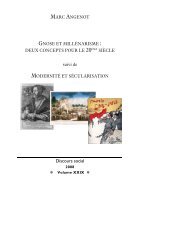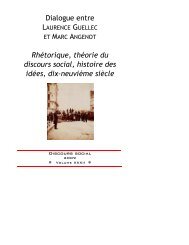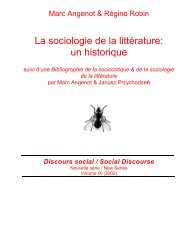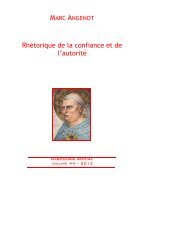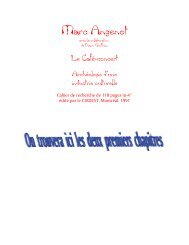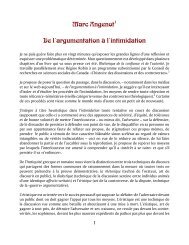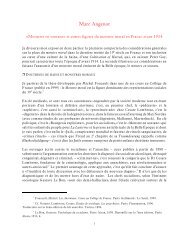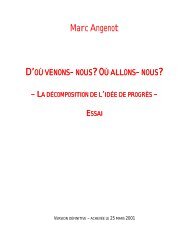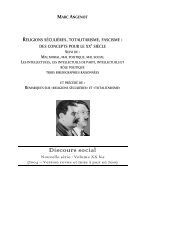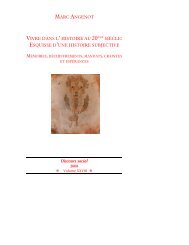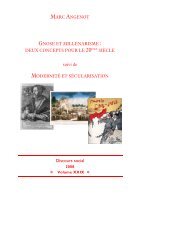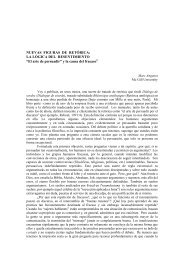L'immunité de la France envers le fascisme: un demi ... - Marc Angenot
L'immunité de la France envers le fascisme: un demi ... - Marc Angenot
L'immunité de la France envers le fascisme: un demi ... - Marc Angenot
You also want an ePaper? Increase the reach of your titles
YUMPU automatically turns print PDFs into web optimized ePapers that Google loves.
avant 1914 concocté l’integralismo qui servira <strong>de</strong> source doctrina<strong>le</strong>: ce<br />
sont encore <strong>un</strong> coup <strong>le</strong>s composantes traditionalistes et clérica<strong>le</strong>s <strong>de</strong> ce<br />
nationalisme «intégral», voulu restaurateur <strong>de</strong> <strong>la</strong> Tradition plutôt que<br />
chercheur d’<strong>un</strong> quelconque Ordre nouveau, nationalisme très influencé<br />
par Maurras et par <strong>le</strong> catholicisme social français, qui font hésiter à<br />
par<strong>le</strong>r <strong>de</strong> «<strong>fascisme</strong>» – si l’on se refuse <strong>un</strong>e fois encore à admettre <strong>la</strong><br />
conception du <strong>fascisme</strong> non comme <strong>un</strong> noyau minimal stab<strong>le</strong>, mais<br />
comme <strong>un</strong>e machine bipo<strong>la</strong>ire, dotée d’<strong>un</strong> pô<strong>le</strong> totalitariste et <strong>un</strong> pô<strong>le</strong><br />
conservateur.<br />
Auc<strong>un</strong> mouvement <strong>de</strong> masse ne jouera <strong>le</strong> moindre rô<strong>le</strong> toutefois dans<br />
<strong>le</strong> passage <strong>de</strong> <strong>la</strong> dictature militaire au régime dominé par Antonio <strong>de</strong><br />
Oliveira Sa<strong>la</strong>zar, homme livresque, pru<strong>de</strong>, calcu<strong>la</strong>teur, introverti et<br />
étroit d’esprit, régime qui se passe <strong>de</strong> parti <strong>un</strong>ique, qui se méfie <strong>de</strong>s<br />
aventures militaires – et qui, à tous ces titres atypiques, sera <strong>le</strong> plus<br />
durab<strong>le</strong> et <strong>le</strong> plus soli<strong>de</strong> <strong>de</strong>s régimes antidémocratiques en Europe<br />
subsistant jusqu’en 1974.<br />
Les historiens portugais en <strong>le</strong>ur majorité qualifient l’Estado novo <strong>de</strong><br />
«fasciste», mais tout <strong>de</strong> même avec quelque nuances et bémols<br />
déterminés par ce manque <strong>de</strong> charisme et <strong>de</strong> f<strong>la</strong>mboyance dans <strong>un</strong> petit<br />
pays retardé f<strong>la</strong>nqué d’<strong>un</strong> immense mais fragi<strong>le</strong> empire colonial. 30<br />
Stan<strong>le</strong>y Payne conclut au contraire qu’<strong>un</strong> <strong>fascisme</strong> sans mouvement<br />
fasciste ne tient pas l’eau et exclut. Roger Griffin reconnaît dans<br />
l’idéologie <strong>de</strong> l’Estado novo tous <strong>le</strong>s paramètres requis par lui, mais voit<br />
dans <strong>le</strong> régime <strong>un</strong> «<strong>fascisme</strong> par en haut», ce qui en fait <strong>un</strong> «parafascism»<br />
tout au plus. «Clérico-fasciste» a pu paraître nuancer <strong>le</strong><br />
c<strong>la</strong>ssement en rapprochant <strong>de</strong>s régimes autrichiens et hongrois. «Semi-<br />
30. Costa Pinto, Antonio. The Blue Shirts : Portuguese Fascists and the New State. New York:<br />
Columbia UP, 2000. + Sa<strong>la</strong>zar’s Dictatorship and European Fascism. Boul<strong>de</strong>r CO: Social Science<br />
Monographs, 1995. voir aussi O Fascismo em Portugal. Lisboa: Regra do jogo, 1982. [= colloque<br />
Univ. Lisbonne, mars 1980]. + Ó, Jorge Ramos <strong>de</strong>. Os anos <strong>de</strong> ferro: o dispositivo cultural durante<br />
a Política <strong>de</strong> Espírito, 1939-1949. Lisboa: Estampa, 1999.<br />
177




